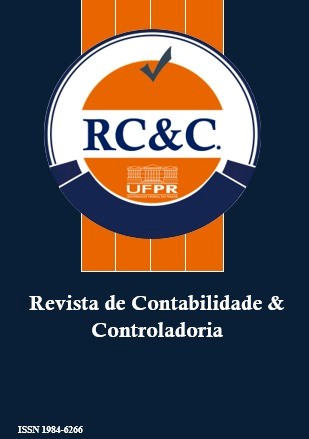Accountability: Inovação Decisória na Avaliação de Investimento em Startups Accountability: Innovative Decision-Making in the Investment Assessment in Startups
DOI:
https://doi.org/10.5380/rcc.v15i3.88935Palavras-chave:
Accountability, Startup, Mercado Venture Capital.Resumo
Este estudo objetiva identificar circunstâncias em accountability que favoreçam decisões a investimentos em startups. Trata-se de uma pesquisa aplicada a investidores atuantes no mercado venture capital, por meio de estudo de casos múltiplos, envolvendo dez empresas investidoras. A ideia é observar se os casos direcionam a resultados semelhantes, ou então por resultados contrários e previsíveis, buscando demonstrar se há alguma contraposição àquilo que se atribui em accountability e as decisões de investimentos em startups. Os estudos de casos ocorreram por meio de entrevistas semiestruturadas face ao nível de significância dos atributos constituídos, sendo estas compiladas e organizadas com emprego do software NVIVO11 e interpretadas com a técnica de análise de conteúdo. Constatou-se que, dentre 20 atributos inicialmente utilizados, apenas 8 apresentaram ser mais expressivos: A1, A2, A5, A6, A8, A9, A12 e A19. Já numa relação somente com atributos em accountability, A26 (formalidades contratuais) foi mais representativo. A investigação apontou que atributos como potencial de crescimento e tamanho da empresa, experiência e reputação dos empreendedores, montante do investimento e diferenciação do produto são determinantes no processo de análise. Conclui-se que no campo da complexidade e subjetividade nas avaliações e tomadas de decisão por parte de investidores em startups, os atributos objetivos se destacam como práxis pelos agentes financeiros, especialmente em virtude dos riscos inerentes.
Referências
Amorim, R. (2016). A. Os critérios de investimento utilizados pelos investidores anjo no Brasil: uma análise sobre suas priorizações. Dissertação (Mestrado). Faculdade de Economia, Administração e Contabilidade, Universidade de São Paulo. São Paulo.
Andrew, J. (2007). Prisons, the profit motive and other challenges to accountability. Critical Perspectives on Accounting, 18(8), 877-904. https://doi.org/01.1016/j.cpa.2006.08.00
Ardichvili, A., Cardozo, R., Tune, K., & Reinach, J. (2002). The role of Angel Investors in the Assembly of non-financial resources of New Ventures: Conceptual Framework and Empirical Evidence. Journal of Enterprising Culture, 10(1), 39-65. https://doi.org/10.1142/S021849580200013X
Associação Anjos do Brasil - AAB. (2021). Anjos pelo Brasil - Núcleos Regionais. Disponível em: <https://www.anjosdobrasil.net/nucleos-regionais.html>. Acesso em: 05/11/2020.
Associação Brasileira de Startups – ABS. (2021). Informação: pesquisas. Disponível em: <https://abstartups.com.br/pesquisas/>. Acesso em: 05/11/2020.
Associação Brasileira de Private Equity e Venture Capital – ABVCAP. (2021). Consolidação de dados de PE e VC: 4° Trimestre de 2020. Disponível em: <https://www.abvcap.com.br/pesquisas/estudos.aspx?c=pt-br>. Acesso em: 05/11/2020.
Barbaro, F. T. (2019). Critérios utilizados no processo de seleção de startups para programas de aceleração. Dissertação (Mestrado). Departamento de Engenharia de Produção, Escola Politécnica, Universidade de São Paulo.
Bardin, L. (2016). Análise de Conteúdo. São Paulo: Edições 70.
Beddewela, E. (2019). Managing corporate community responsibility in multinational corporations: Resolving institutional duality. Long Range Planning, 52(6), 101911. https://doi.org/10.1016/j.lrp.2019.101911
Cavallo, A., Ghezzi, A., Dell’era, C., & Pellizzoni, E. (2019). Fostering digital entrepreneurship from startup to scaleup: The role of venture capital funds and angel groups. Technological Forecasting and Social Change, 145, 24-35, 2019. https://doi.org/10.1016/j.techfore.2019.04.022
Cohen, S., Fehder, D. C., Hochberg, Y. V., & Murray, F. (2019). The design of startup accelerators. Research Policy, 48(7), 1781-1797. https://doi.org/10.1016/j.respol.2019.04.003
Cox, K. C., Lortie, J., & Stewart, S. A. (2017). When to pray to the angels for funding: The seasonality of angel investing in new ventures. Journal of Business Venturing Insights, 7, 68- 76. https://doi.org/10.1016/j.jbvi.2017.03.003
Dalmarco, G., Maehler, A. E., Trevisan, M., & Schiavini, J. M. (2017). The use of knowledge management practices by Brazilian startup companies. Revista de Administração e Inovação, 14(3), 226-234. https://doi.org/10.1016/j.rai.2017.05.005
Eisenhardt, K. M. (1989). Building Theories from Case Study Research. Academy of Management Preview, 14(4), 532-550. https://doi.org/10.2307/258557
Erdogan, B., Sparrowe, R. T., Liden, R. C., & Dunegan, K. J. (2004). Implications of organizational exchanges for accountability theory. Human Resource Management Review, 14(1), 19-45. https://doi.org/10.1016/j.hrmr.2004.02.002
Feeney, L., Haines, G., & Riding, A. (2010). Private investors’ investment criteria: insights from qualitative data. Venture Capital: An International Journal of Entrepreneurial Finance, 1(2), 121-145. https://doi.org/10.1080/136910699295938
Fichter, K., Lüdeke-Freund, F., Schaltegger, S., & Schillebeeckx, S. J. (2022). Sustainability impact assessment of new ventures: An emerging field of research. Journal of Cleaner Production, 135452. https://doi.org/10.1016/j.jclepro.2022.135452
Genus, A., & Stirling, A. (2018). Collingridge and the dilemma of control: Towards responsible and accountable innovation. Research Policy, 47(1), 61-69. https://doi.org/10.1016/j.respol.2017.09.012
Gil, A. C. (2019). Métodos e técnicas de pesquisa social (7a. ed.). São Paulo: Atlas.
Haar, N. E., Starr, J., & Macmillan, I. C. (1988). Informal risk capital investors: investment patterns on the East Coast of the U.S.A. Journal of Business Venturing, 3(1), 11-29. https://doi.org/10.1016/0883-9026(88)90027-4
Hegeman, P. D., & Sørheim, R. (2021). Why do they do it? Corporate venture capital investments in cleantech startups. Journal of Cleaner Production, 294, 126315. https://doi.org/10.1016/j.jclepro.2021.126315
Hemphill, T. A. (2020). The innovation governance dilemma: Alternatives to the precautionary principle. Technology in Society, 63, 101381. https://doi.org/10.1016/j.techsoc.2020.101381
Ingley, C. B., & McCaffrey, K. (2007). Effective governance for start-up companies: regarding the board as a strategic resource. International Journal of Business Governance and Ethics, 3(3), 308-329. https://doi.org/10.1504/IJBGE.2007.014319
Joannides, V. (2012). Accounterability and the problematics of accountability. Critical Perspectives on Accounting, 23(3), 244-257. https://doi.org/10.1016/j.cpa.2011.12.008
Kerr, W., & Nanda, R. (2015). Financing Innovation. Annual Review of Financial Economics, 7(7), 445-462. https://doi.org/10.1146/annurev-financial-111914-041825
Landström, H. (1998). Informal investors as entrepreneurs: Decision-making criteria used by informal investors in their assessment of new investment proposals. Technovation, 18(5), 321-333. https://doi.org/10.1016/S0166-4972(98)00001-7
Lima, G. (2020). DealflowBR: Mapa de Investidores de Startups do Brasil. Disponível em: <http://dealflowbr.com/mapa-de-investidores-de-startups-do-brasil/>. Acesso em: 05/11/2020.
Lindgren, B. M., Lundman, B., & Graneheima, U. H. (2020). Abstraction and interpretation during the qualitative content analysis process. International Journal of Nursing Studies, 108, 103632. https://doi.org/10.1016/j.ijnurstu.2020.103632
Liu, W., Shao, X., Sisto, M., & Li, W. H. (2020). A new approach for addressing endogeneity issues in the relationship between corporate social responsibility and corporate financial performance. Finance Research Letters, 101623. https://doi.org/10.1016/j.frl.2020.101623
López-González, E., Martínez-Ferrero, J., & García-Meca, E. (2019). Corporate social responsibility in family firms: A contingency approach. Journal of Cleaner Production, 211, 1044-1064. https://doi.org/10.1016/j.jclepro.2018.11.251
Luo, Y. (2005). Corporate governance and accountability in multinational enterprises: Concepts and agenda. Journal of International Management, 11(1), 1-18. https://doi.org/10.1016/j.intman.2004.11.001
Machado, F. G. (2015). Investidor anjo: uma análise dos critérios de decisão de investimento em startups. Dissertação (Mestrado). Faculdade de Economia, Administração e Contabilidade, Universidade de São Paulo.
Macmillan, I. C., Siegel, R., & Narasimha, P. N. S. (1985). Criteria used by venture capitalists to evaluate new venture proposals. Journal of Business Venturing, 1(1), 119-128. https://doi.org/10.1016/0883-9026(85)90011-4
Macmillan, I. C., Zemann, L., & Subbanarasimha, P. N. (1987). Criteria distinguishing successful from unsuccessful ventures in the venture screening process. Journal of Business Venturing, 2(2), 123-137. https://doi.org/10.1016/0883-9026(87)90003-6
Mann, W. (2018). Creditor rights and innovation: Evidence from patent collateral. Journal of Financial Economics, 130(1), 25-47. https://doi.org/10.1016/ j.jfineco.2018.07.001
Mason, C. M., & Harrison, R. T. (1996). Why business angels’ say no: a case study of opportunities rejected by an informal investor. International Small Business Journal, 14(2), 35-51. https://doi.org/10.1177/0266242696142003
Mason, C., & Stark, M. (2004). What do investors look for in a business plan? International Small Business Journal, 22(3), 227-248. https://doi.org/10.1177/0266242604042377
Maxwell, A. L., Jeffrey, S. A., & Lévesque, M. (2011). Business angel early stage decision making. Journal of Business Venturing, 26(2), 212-225. https://doi.org/10.1016/j.jbusvent.2009.09.002
Nanda, R., & Rhodes-Kropf, M. (2013). Investment cycles and startup innovation. Journal of Financial Economics, 110(2), 403-418. https://doi.org/10.1016/ j.jfineco.2013.07.001
Noélia, F. L., & Rosália, D. C. (2020). A dynamic analysis of the role of entrepreneurial ecosystems in reducing innovation obstacles for startups. Journal of Business Venturing Insights, 14, e00192. https://doi.org/10.1016/j.jbvi.2020.e00192
Nunes, L. B. (2021). Advocacia corporativa em disrupção: a nova gestão jurídica empresarial, teoria e prática. Belo Horizonte: Editora Dialética.
O’Connor, J. T., & Mock, B. (2020). Responsibilities and accountabilities for industrial facility commissioning and startup activities. Construction Innovation, 20(4), 625-645. https://doi.org/10.1108/CI-09-2019-0094
Parhankangas, A., & Ehrlich, M. (2014). How entrepreneurs seduce business angels: An impression management approach. Journal of Business Venturing, 29, 543-564. https://doi.org/10.1016/j.jbusvent.2013.08.001
Pinho, J. A. G., & Sacramento, A. R. S. (2009). Accountablity: já podemos traduzi-la para o português? Revista de Administração Pública, 43(6), 1343-1368. http://dx.doi.org/10.1590/S0034-76122009000600006
Purpura, P. P. (2019). Accounting, Accountability, and Auditing. Security and Loss Prevention. 7 ed. Butterworth-Heinemann. E-book, Chapter 11, 337-354. DOI: https://doi.org/10.1016/B978-0-12-811795-8.00011-4
Rechtman, M., & Young, C. E. F. (2013). Avaliação de investimentos sustentáveis. Rio de Janeiro: Navona.
Ries, E. (2019). A Startup enxuta: Como usar a inovação contínua para criar negócios radicalmente bem-sucedidos. Rio de Janeiro: Sextante.
Roychowdhury, S., Shroff, N., & Verdi, R. S. (2019). The effects of financial reporting and disclosure on corporate investment: A review. Journal of Accounting and Economics, 68(2-3), 101246. https://doi.org/10.1016/j.jacceco.2019.101246
Santi Jr. C., & Neves, G. T. (2020). New and Future Developments in Microbial Biotechnology and Bioengineering. Microbial Biomolecules: Properties, Relevance, and their Translational Applications. Chapter 10 - Startups and prominent business. Elsevier, 209-223. https://doi.org/10.1016/B978-0-444-64301-8.00010-X
Shimasaki, C. (2020). Investor Presentations: What Do You Need in an Investor Pitch Deck? Biotechnology Entrepreneurship, Chapter 23, 2 Ed., Leading, Managing and Commercializing Innovative Technologies, 325-336. https://doi.org/10.1016/B978-0-12-815585-1.00023-1
Shroff, N., Verdia, R. S., & Yost, B. P. (2017). When does the peer information environment matter? Journal of Accounting and Economics, 64(2-3), 183-214. https://doi.org/10.1016/j.jacceco.2017.03.005
Svärd, P. (2017). Accountability, transparency, and the role of information management. Enterprise Content Management, Records Management and Information Culture Amidst e-Government Development, E-book: Elsevier, 83-96. https://doi.org/10.1016/B978-0-08-100874-4.00007-7
Vanacker, T., Collewaert, V., & Paeleman, I. (2013). The relationship between slack resources and the performance of entrepreneurial firms: the role of venture capital and angel investors. Journal of Management Studies, 50(6), 1070-1096. https://doi.org/10.1111/joms.12026
Voss, C., Tsikriktsis, N., & Frohlich, M. (2002). Case research in operations management. International Journal of Operations & Production Management, 22 (2), 195-219. https://doi.org/10.1108/01443570210414329
Wöhler, J., & Haase, E. (2022). Exploring investment processes between traditional venture capital investors and sustainable start-ups. Journal of Cleaner Production, 134318. https://doi.org/10.1016/j.jclepro.2022.134318
Yin R. K. (2015). Estudo de caso: planejamento e métodos (5a. ed.). Porto Alegre: Bookman.
Zinecker, M., & Bolf, D. (2015). Venture capitalists’ investment selection criteria in CEE countries and Russia. Verslas: Teorija ir Praktika, 16(1), 94-103. https://doi.org/10.3846/btp.2015.441
Downloads
Publicado
Como Citar
Edição
Seção
Licença
Copyright (c) 2023 RC&C. Revista de Contabilidade e Controladoria

Este trabalho está licenciado sob uma licença Creative Commons Attribution-NonCommercial-NoDerivatives 4.0 International License.
Os trabalhos publicados na RC&C. Revista de Contabilidade e Controladoria estão sujeitos aos seguintes termos:
1.1. A RC&C. Revista Contabilidade & Controladoria, através do Programa de Pós-Graduação em Contabilidade do Departamento de Contabilidade - Setor de Ciências Sociais Aplicadas - Universidade Federal do Paraná, retém os direitos de propriedade (direitos autorais) dos trabalhos publicados e incentiva e permite sua reutilização sob a Licença Creative Commons 4.0 de CC Attribution-NonCommercial-ShareAlike 4.0, para que possam ser copiados, utilizados, disseminados, transmitidos e exibidos publicamente, desde que:
1.1.a. A autoria e a fonte original da publicação (periódico, editora, URL e DOI do trabalho) sejam citadas.
1.1.b. Não sejam utilizados para fins comerciais ou onerosos.
1.1.c. A existência e as especificações desta licença de uso são mencionadas.
1.2. A publicação atribuirá a cada artigo um Identificador de Objeto Digital (DOI).









